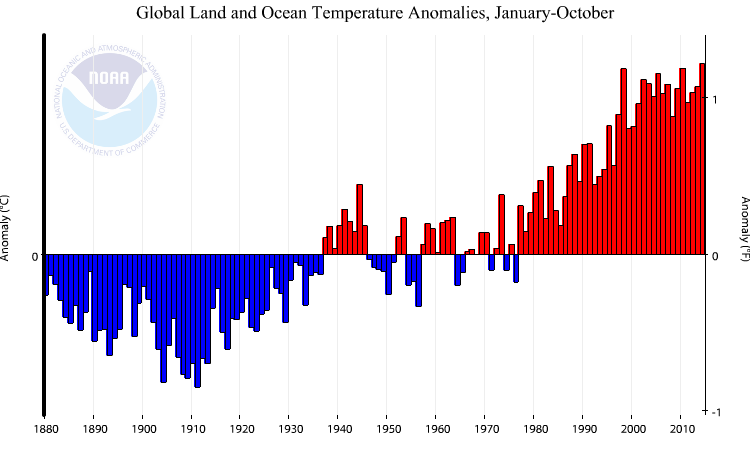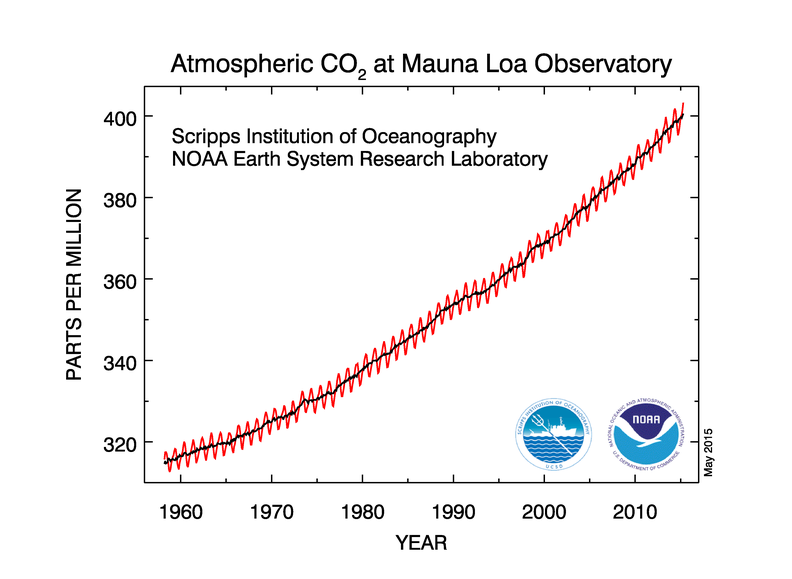Carolyn Cox at University of Florida and the Florida Climate Institute forwarded some questions to me that an 8th grader had for a project on climate change. My first reaction was to point her to one of the many existing websites that answer these sorts of questions and be done with it... until I read the questions! They were a little different spin and more insightful than most of my discussions about climate change with (educated) adults. I started to answer them and just got on a roll, so I hope she forgives me for being too verbose!
1. When did climate change/global warming start? How could scientists tell it was starting?
Man-made or anthropogenic climate change is generally considered to start with the industrial revolution, around the middle of the 19th century (1850). It was at this time that big factories started to flourish, and they needed an energy source to fire the steel mills and provide power. Coal was the big fuel at first and used in the factories, but also to generate electric power once electricity became available. About that time oil was also discovered in Pennsylvania and became another source of energy. All this burning of coal, oil, and natural gas (fossil fuels) increased the concentration of carbon dioxide in the atmosphere over natural levels.
In 1896 Svante Arrhenius, a Swedish scientist, was the first to publish the theory that excess carbon dioxide in the atmosphere will absorb more long wave or infrared radiation, leading to a general warming of the planet.
With the two world wars and most research effort being put into weather prediction, not a lot more was learned about global warming in the first half of the 20th century. In 1958 Charles Keeling began taking very accurate measurements of CO2 in the atmosphere on the top of Mauna Loa in the Hawaiian Islands. This was the first continuous series of accurate measurements of CO2 in the atmosphere. Concentrations were around 315 parts per million (ppm) in 1958, but have risen steadily since then until they are over 400 ppm today.

We did not have widespread and accurate temperature measurements around the globe prior to 1850 or so. However, we do have pretty good records since 1900 and they show a corresponding increase in the global average temperature of about 0.8 degrees Celsius, or nearly 2 degrees Fahrenheit. Scientists also see changes in ocean temperatures, snow and ice cover, sea ice, and rising sea levels that all point to a general warming of the planet.

2. How has the problem changed over the last 10, 5, 2 years?
The short answer is not much. Some countries like the United States and European Union countries have reduced emissions of C02 in recent years (mostly due to the availability of natural gas from fracking in the U.S.), others like China and India continue to increase greatly each year. Even with reduced emissions, we are still putting a bunch of excess C02 in the atmosphere and concentrations continue to rise. Climate science has made substantial advances in the last decade, so we know better how things like the how Arctic and Antarctic ice are reacting, along with changes in heavy rainfall, droughts, and other extreme weather. Still, society as a whole has not made any real strides in stopping or slowing climate change.
With President Obama's support, the EPA has proposed guidelines that will cut CO2 emissions from power plants by 30% by 2030. We have also reached an agreement with China, the world’s largest source of CO2, that they will reach their peak emissions by 2030. This is a great start to the worldwide summit to be held in Paris later this year where each nation will pledge their own cuts.
As for the climate itself, the rate of global warming has slowed since 1998 in what is now known as the "global warming hiatus". Skeptics point to this hiatus as proof that climate change is not that big a deal. Climate science has shown there is around a 30-year cycle in warming and cooling of the planet, and being in the cooling phase of this cycle is what has slowed global warming. Other studies suggest that the deep ocean is absorbing some of the excess heat. Regardless, 9 of the worlds 10 warmest years have occurred since 2000 and most scientists agree that the cycle will return to a more rapid warming soon.

3. Are there opposing viewpoints about the situation?
On some things the science is very clear and there is nearly universal agreement among scientists. There is no debate that humans have changed the amount of C02 and other greenhouse gasses in the atmosphere. All scientists also agree that the world has been warming over the last century and that the greenhouse gasses play a part. A vast majority of scientists also accept that humans have played the largest role in this warming, but some question if natural variations or cycles are not also a cause.
Where disagreement becomes stronger is in the details, where the science is not as well established and there is considerable uncertainty. Questions like just how sensitive is the climate system to C02? Are extreme events changing and by how much? Will sea level continue to rise at the current rate, or get much higher? How will temperature, rainfall, extreme events change where I live? And the big one, will climate change be slow enough for the planet, plants and animals, and us to easily adapt, or will it be more abrupt and cause major disruptions to society and catastrophic ecological consequences? Will the world be able to change how it uses energy enough to make a difference, and should we? Questions like these are where the real debate lies and science does not give us concrete answers, yet.
4. Are there any policies or laws in place that are meant to address the issue?
Before we talk about policies, let me explain the difference between adaptation and mitigation. Adaptation refers to how we react to the current and projected changes in climate, how we deal with the reality of climate change. Measures like protecting and relocating coastal communities in the face or rising sea levels or changing farming practices to deal with more heat and variations in rainfall are examples of adaptation. Mitigation means trying to stop or slow climate change by reducing our emissions of greenhouse gases.
On the national level, climate change policies mostly deal with mitigation. The only real policy in place is the EPA's requirement that emissions from power plants be cut by 30% by 2030. President Obama also rolled out his Climate Action Plan in November of 2014, including an agreement with China where we pledge to cut all carbon emissions by 28% by the year 2025. Some say these goals are overly ambitious and will harm the economy and our way of life. Others say they are not enough and will not make much difference in slowing climate change. Either way, many state governments and members of the House of Representatives and the Senate will oppose these measures.
On the State level, Florida's Governor Rick Scott does not view climate change as a pressing issue. He made national news recently for allegedly banning the use of the terms "climate change" and "global warming" in the various State agencies.
In spite of this culture, there is a lot good work going on in the State concerning climate change, mostly from the adaptation side. Florida Department of Transportation factors in rising sea levels in the design of new or upgraded roads and bridges. We are working with the Department of Health to assess how climate and human health and disease are related and how that can change in the future. On the local level, the four Southeast Florida coastal counties have formed the Southeast Florida Regional Climate Compact that follow common standards for upgrading roads, utilities, and other infrastructure as well a community planning and zoning.
5. How can the average Floridian help reduce climate change/global warming?
There is actually a lot that the average citizen can do to reduce their contribution to carbon dioxide emissions and climate change. The first thing is to conserve energy... do everything you can to make your home more energy efficient, use heating air conditioning, hot water less, try to take fewer trips in the car or combine trips and own a fuel efficient vehicle. Other bigger steps are to install solar energy panels on your home to help provide electricity and heat water. Another overlooked step that also has beneficial health impacts is to eat less meat. Beef, poultry, pork, etc. take much more energy to raise than vegetable crops, especially since grains and grasses that feed the animals have to be grown also, which takes energy.
The other big thing is to voice your opinion and especially VOTE! If we the voters demand politicians to address climate change or not receive our vote, they will hop on board pretty quickly.
6. Will climate change ever bring benefit to some areas?
This may be the best question of the bunch. Some agricultural areas will likely see benefits from longer growing seasons, more rainfall, and even more CO2 in the atmosphere can benefit some crops as plants use it for photosynthesis. With human health, far more people die worldwide from extreme cold than from heat waves. A shift towards a warmer planet may actually prevent some deaths. These are just some examples, I am sure there are many more. Too often the news media and even climate research itself focuses on the negatives of climate change, disregarding the possible positive outcomes.
7. Could climate change/global warming ever wipe us out?
No, not in our lifetime anyway and its very unlikely that it would in your future children's or grandchildren's lifetime either. Human civilization faces a whole host of challenges and stressors going forward the next several hundred years and climate change is only one of them. Ever increasing population, degradation of the environment, clean water supply, availability and security of food, availability of energy, unstable global economy, war and terrorism, disease and antibiotic resistant bacteria are all very serious concerns that could have a great impact on human society. And all of these threats are interrelated, influencing the others. Climate change could very well make many or all of these problems worse, but they will still be problems with or without the influence of climate change.
Many scientists also believe that the earth/ocean/atmosphere/ice system wants to find a balance, and that it will adjust to the excess greenhouse gasses without too drastic a change. Others believe there may be a "tipping point", where too high a concentration of greenhouse gasses will lead to runaway warming. That being said, the most sophisticated computer climate models around the world predict various degrees of warming by the end of this century, but none of them predict runaway climate change.
Also keep in mind that the earth's climate has seen more drastic changes in its history than what is occurring now from global warming. During one prehistoric period the earth was completely frozen and covered in ice, in others the poles were ice-free and the ocean warm near the North Pole. Most recently, we came out of the last ice age about 12,000 years ago and humans survived through it. Due to subtle changes in the earth's orbit and tilt, we will likely enter another ice age sometime in the next 10,000 years.
Enough doom and gloom...human beings are the most adaptable creatures this world has ever seen and we have great potential to solve and deal with problems through technology and working together towards the common good. Sooner or later this will be the case with our energy use and climate change.

